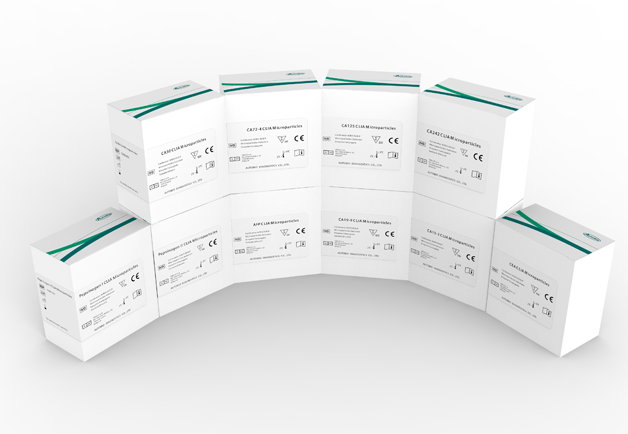

Gastric cancer adalah kanker umum keempat di seluruh dunia, dan itu adalah penyebab kematian paling umum kedua akibat kanker [1]. Deteksi dini penting untuk meningkatkan tingkat kelangsungan hidup pasien dengan gastric cancer (GC).
Beberapa penanda tumor serum termasuk alpha-fetoprotein (AFP), carcinoembryonic antigen (CEA), carcinoembryonic antigen (CA) 19-9, CA50, dan CA72-4 telah dilaporkan meningkat pada beberapa pasien dengan kanker lambung [2-4] .
No. Katalog | Pengujian | Jumlah | Tipe sampel | Volume Sampel | |
CLIA Microparticles | CMB0102 | AFP | 100T | serum | 25 µL |
CMB0202 | CEA | 100T | serum | 25 µL | |
CMB0402 | CA50 | 100T | serum | 25 µL | |
CMB0802 | CA19-9 | 100T | serum | 25µL | |
CMB1402 | CA72-4 | 100T | serum | 50 µL |
Peningkatan kadar AFP juga dapat dideteksi pada tumor ganas berbagai organ, termasuk lambung, paru-paru, pankreas, usus besar, kandung kemih, dan ovarium.[5-11]
Pada kanker lambung stadium lanjut atau berulang, estimasi nilai serum CA 19-9 atau CA-50 dan CEA dapat membantu dalam memeriksa prognosis, menentukan kemanjuran modalitas pengobatan paliatif, dan mengenali kekambuhan. [12]
CA72-4 sangat sensitif terhadap kanker lambung, dan tingkat positif CA72-4 serum pada kanker lambung dilaporkan 36% sampai 94%. Dan spesifisitasnya juga tinggi, bahkan ada yang mencapai 100%.[13]CA72-4 dapat digunakan untuk mendeteksi apakah ada sisa sel tumor setelah operasi dan menilai prognosis kanker lambung.[14]
[1].Suenaga Y, Kanda M, Ito S, Mochizuki Y, Teramoto H, Ishigure K, Murai T, Asada T, Ishiyama A, Matsushita H, Tanaka C, Kobayashi D, Fujiwara M, Murotani K, Kodera Y. Prognostic significance of perioperative tumor marker levels in stage II/III gastric cancer. World J Gastrointest Oncol 2019; 11(1): 17-27 [PMID: 30984347 DOI: 10.4251/wjgo.v11.i1.17]
[2]Ychou M, Duffour J, Kramar A, Gourgou S, Grenier J: Clinical significance and prognostic value of CA 72-4 compared with CEA and CA19-9 in patients with gastric cancer. Dis Markers. 2000, 16: 105-110.
[3]Gao ZL, Zhang C, Du GY, Lu ZJ: Clinical significance of changes in tumor markers, extracellular matrix, MMP-9 and VEGF in patients with gastric carcinoma. Hepatogastroenterology. 2007, 54: 1591-1595.
[4]Adachi Y, Tsuchihashi J, Shiraishi N, Yasuda K, Etoh T, Kitano S: AFP-producing gastric carcinoma: multivariate analysis of prognostic factors in 270 patients. Oncology. 2003, 65: 95-101. 10.1159/000072332.
[5]Yamagata T, Yamagata Y, Nakanishi M, Matsunaga K, Minakata Y and Ichinose M: A case of primary lung cancer producing alpha-fetoprotein. Can Respir J. 11:504–506. 2004.
[6]Hamanaka W, Yoneda S, Shirakusa T, et al: Alpha-fetoprotein (AFP)-producing adrenocortical carcinoma-long survival with various therapeutic strategies including a lung resection: Report of a case. Surg Today. 38:275–278. 2008.
[7]Matsueda K, Yamamoto H, Yoshida Y and Notohara K: Hepatoid carcinoma of the pancreas producing protein induced by vitamin K absence or antagonist II (PIVKA-II) and alpha-fetoprotein (AFP). J Gastroenterol. 41:1011–1019. 2006.
[8]Kinjo T, Taniguchi H, Kushima R, Sekine S, Oda I, Saka M, Gotoda T, Kinjo F, Fujita J and Shimoda T: Histologic and immunohistochemical analyses of α-fetoprotein-producing cancer of the stomach. Am J Surg Pathol. 36:56–65. 2012.
[9]Cappetta A, Bergamo F, Mescoli C, Lonardi S, Rugge M and Zagonel V: Hepatoid adenocarcinoma of the colon: What should we target? Pathol Oncol Res. 18:93–96. 2012.
[10]Kawamura N, Hatano K, Kakuta Y, Takada T, Hara T and Yamaguchi S: A case of hepatoid adenocarcinoma of the urinary bladder. Hinyokika Kiyo. 55:619–622. 2009.(In Japanese).
[11]Isonishi S, Ogura A, Kiyokawa T, Suzuki M, Kunito S, Hirama M, Tachibana T, Ochiai K and Tanaka T: Alpha-fetoprotein (AFP)-producing ovarian tumor in an elderly woman. Int J Clin Oncol. 14:70–73. 2009.
[12]D Pectasides 1, A Mylonakis, M Kostopoulou, M Papadopoulou, D Triantafillis, J Varthalitis, M Dimitriades, A Athanassiou. CEA, CA 19-9, and CA-50 in monitoring gastric carcinoma. Am J Clin Oncol. 1997 Aug;20(4):348-53. doi: 10.1097/00000421-199708000-00005.
[13]. Cappellani A, Zanghi A, Di Vita M, et al. Clinical and biological markers in gastric cancer: update and perspectives. Front Biosci (Schol Ed) 2010;2:403–12.
[14]. Nicolini A, Ferrari P, Duffy MJ, et al. Intensive risk-adjusted follow-up with the CEA, TPA, CA19.9, and CA72.4 tumor marker panel and abdominal ultrasonography to diagnose operable colorectal cancer recurrences: effect on survival. Arch Surg (Chicago, Ill: 1960) 2010;145:1177–83.